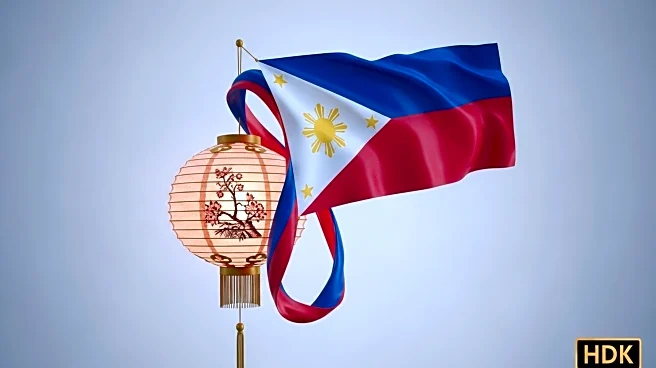What is the story about?
What's Happening?
The Philippines has reiterated its commitment to the One China Policy, emphasizing its non-recognition of Taiwan as a sovereign state. This stance was highlighted in a recent statement by the Department of Foreign Affairs, which underscored the importance of maintaining peace and stability in the region. The Philippines continues to engage economically with Taiwan, focusing on trade, investment, and tourism, while adhering to the One China Policy. This diplomatic position is crucial given the geographical proximity of the Philippines to Taiwan and the presence of a significant number of Filipinos working there. The reaffirmation comes amid rising tensions between China and Taiwan, with the Philippines seeking to balance its relations with both China and the United States.
Why It's Important?
The Philippines' adherence to the One China Policy is significant in maintaining diplomatic and economic stability in the region. By upholding this policy, the Philippines aims to avoid direct involvement in the cross-strait political dispute, which could have severe economic and security implications. The policy allows the Philippines to maintain beneficial economic ties with China, one of its top trading partners, while also engaging informally with Taiwan. This strategic balancing act is crucial for the Philippines to navigate the complex geopolitical landscape, especially with the ongoing territorial disputes in the West Philippine Sea. The reaffirmation of the One China Policy also reflects the Philippines' attempt to safeguard its national interests and ensure regional peace.
What's Next?
The Philippines is likely to continue its diplomatic balancing act, maintaining economic engagements with both China and Taiwan while adhering to the One China Policy. The country may also seek to strengthen its alliances within the Association of Southeast Asian Nations (ASEAN) to enhance its economic security and reduce reliance on major powers. Additionally, the Philippines may focus on enhancing its maritime, aerial, and surveillance capabilities to deter threats in the West Philippine Sea. As tensions between China and Taiwan persist, the Philippines will need to carefully navigate its foreign policy to avoid being drawn into potential conflicts.
Beyond the Headlines
The Philippines' stance on the One China Policy highlights the broader geopolitical dynamics in the region. The policy serves as a tool for the Philippines to manage its relations with China and the United States, both of which have significant strategic interests in the region. The Philippines' approach also underscores the importance of economic pragmatism in its foreign policy, as it seeks to balance development and defense priorities. The ongoing tensions in the Taiwan Strait and the West Philippine Sea illustrate the challenges faced by smaller nations in maintaining sovereignty and stability amid great power rivalries.















